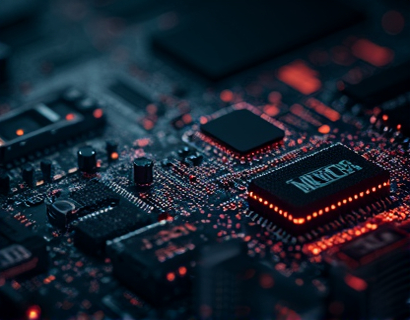Unlocking Digital Transformation: Leveraging Crypto and AI for Enhanced Productivity and Engagement
The digital landscape is rapidly evolving, driven by groundbreaking technologies such as cryptocurrency and artificial intelligence. These innovations are not just changing how we interact with digital tools but are also redefining productivity and engagement in the workplace. This article delves into the transformative power of these technologies, offering a comprehensive guide to the latest tools and applications that can significantly enhance efficiency and innovation. Whether you are a tech professional or an enthusiast, understanding and leveraging these advancements is crucial for staying ahead in the digital era.
Understanding Cryptocurrency and Its Role in Digital Transformation
Cryptocurrency, often associated with digital currencies like Bitcoin and Ethereum, is more than just a financial asset. It represents a paradigm shift in how we think about value, transactions, and decentralization. At its core, cryptocurrency utilizes blockchain technology, a distributed ledger that ensures transparency, security, and immutability. This technology has far-reaching implications beyond finance, impacting various sectors including supply chain management, healthcare, and, most relevantly, digital productivity tools.
In the context of digital transformation, cryptocurrency enables new forms of decentralized applications (dApps) and smart contracts. These tools can automate and secure processes, reducing the need for intermediaries and increasing efficiency. For instance, smart contracts can streamline contract management, payment processes, and compliance checks, all of which are critical for businesses aiming to enhance their operational productivity.
Harnessing the Power of Artificial Intelligence
Artificial intelligence (AI) is another cornerstone of digital transformation, offering unparalleled capabilities in data analysis, automation, and decision-making. AI technologies, including machine learning and natural language processing, are revolutionizing how businesses operate by providing insights that were previously unattainable. When combined with cryptocurrency, AI can further enhance the functionality and security of digital tools.
AI-driven analytics can process vast amounts of data to identify patterns, predict trends, and optimize workflows. For example, AI can automate routine tasks, freeing up employees to focus on more strategic activities. In the realm of customer service, AI-powered chatbots can provide instant support, improving customer engagement and satisfaction. When these AI tools are integrated with blockchain, they gain an additional layer of security and transparency, making them even more powerful for digital transformation initiatives.
Integrating Cryptocurrency and AI for Enhanced Productivity
The synergy between cryptocurrency and AI creates a powerful ecosystem for digital transformation. By leveraging the strengths of both technologies, organizations can develop innovative solutions that not only boost productivity but also ensure secure and transparent operations. Here are some key applications and tools that demonstrate this integration:
- Decentralized Cloud Storage: Platforms like Filecoin use blockchain to create a decentralized cloud storage system. AI can optimize storage allocation and data retrieval, ensuring efficient use of resources and enhanced security.
- Tokenized Rewards Systems: AI can analyze employee performance and behavior to create personalized tokenized reward systems. These tokens, based on cryptocurrencies, can motivate and engage employees by providing a tangible incentive linked to their contributions.
- Smart Supply Chain Management: Combining blockchain with AI can create transparent and efficient supply chains. AI can predict demand, optimize inventory, and detect anomalies, while blockchain ensures that all transactions are secure and verifiable.
- Decentralized Finance (DeFi) for Business Operations: DeFi platforms offer a range of financial services without traditional intermediaries. AI can enhance these services by providing sophisticated risk management and automated trading solutions, making financial operations more efficient and accessible.
- AI-Driven Content Creation: AI tools can generate high-quality content, from articles to marketing materials, using data-driven insights. When integrated with blockchain, these tools can ensure content authenticity and ownership, reducing the risk of plagiarism and unauthorized use.
Tools and Platforms for Crypto and AI Integration
Several tools and platforms are emerging to facilitate the integration of cryptocurrency and AI, making it easier for organizations to adopt these technologies. These platforms offer a range of features that can significantly enhance digital productivity and engagement:
1. Blockchain Development Frameworks
Frameworks like Ethereum's Solidity and Hyperledger Fabric provide developers with the tools needed to build secure and scalable dApps. These frameworks support smart contract development, enabling businesses to automate processes and create decentralized applications that enhance productivity.
2. AI-Powered Analytics Platforms
Platforms such as Google Cloud AI and IBM Watson offer advanced analytics capabilities powered by AI. These tools can process and analyze large datasets to provide actionable insights, helping businesses make informed decisions and optimize their operations.
3. Decentralized Marketplaces
Marketplaces like OpenBazaar and LocalBitcoins leverage blockchain to create peer-to-peer trading environments. AI can enhance these platforms by personalizing user experiences, recommending products, and ensuring secure transactions.
4. Token Management Solutions
Tools like MetaMask and Trust Wallet simplify the management of cryptocurrencies and tokens. AI can be integrated into these wallets to provide predictive analytics, automate transactions, and enhance security through biometric authentication.
5. Collaboration and Communication Platforms
Platforms like Discord and Slack are evolving to incorporate blockchain and AI features. For instance, AI-powered bots can manage channels, automate tasks, and ensure secure communication, while blockchain can verify user identities and maintain data integrity.
Benefits of Crypto and AI Integration
The combination of cryptocurrency and AI offers numerous benefits for organizations looking to enhance their digital transformation efforts:
- Increased Efficiency: Automation of routine tasks and optimized workflows lead to significant time savings and cost reductions.
- Enhanced Security:
- Improved Transparency:
- Data-Driven Decision Making:
- Innovative Engagement:
Blockchain's inherent security features, combined with AI's advanced threat detection capabilities, create a robust defense against cyber threats.
Decentralized systems ensure that all transactions and processes are transparent and verifiable, building trust among stakeholders.
AI's ability to analyze vast datasets provides valuable insights, enabling data-driven decision-making and strategic planning.
Tokenized rewards and decentralized applications offer new ways to engage and motivate employees, customers, and partners.
Challenges and Considerations
While the potential benefits are significant, there are also challenges and considerations to keep in mind when integrating cryptocurrency and AI:
1. Regulatory Compliance
The regulatory landscape for cryptocurrency is still evolving, and compliance can be complex. Organizations must stay informed about local and international regulations to avoid legal issues.
2. Technical Complexity
Integrating blockchain and AI requires specialized knowledge and skills. Organizations may need to invest in training or hire experts to navigate these technologies effectively.
3. Scalability and Performance
As the use of these technologies scales, ensuring performance and scalability becomes crucial. Organizations must choose solutions that can handle growing demands without compromising on security or efficiency.
4. User Adoption
Successful integration depends on user adoption. Educating employees and stakeholders about the benefits and usage of these technologies is essential for widespread acceptance.
Conclusion
The integration of cryptocurrency and AI represents a powerful force in digital transformation, offering unprecedented opportunities for enhancing productivity and engagement. By leveraging the latest tools and platforms, organizations can unlock new levels of efficiency, security, and innovation. As the digital landscape continues to evolve, embracing these technologies will be key to staying competitive and relevant in the future.










































